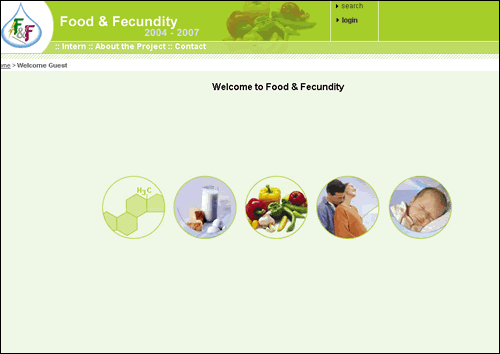| Food & Fecundity |
||||||||||||||||||||
 | ||||||||||||||||||||
| background In recent years there has been a growing interest in the significance of reported declines in human fecundity. Since many chemicals have been shown experimentally to mimic the activities of reproductive hormones, the potential exists that exposure to environmental chemicals has an influence on human reproductive endpoints. A particular aspect that has received relatively little attention is the possible impact of chemical exposure on human fecundity. In particular, it is unknown to what extent food, acting as a vector of synthetic endocrine disrupters, impacts on fecundity. So far, studies have focused mainly on the conventional priority endocrine disruptors: pesticides, heavy metals, and toxic environmental contaminants of industrial origin. One large class of chemical that has received little attention is that of pharmaceutical products (PPs), which are used in quantities comparable with those of agrochemicals. Currently, very little is known of the occurrence, fate and effects of PPs in the environment. Our understanding of the possible transmission of PPs into the food chain is also very rudimentary, and even less is known on how such food affects human fecundity. Part of the problem arises from the scarcity of simple and efficient methods for cleaning up and concentrating PPs from environmental and food samples, and from the lack of diagnostic assays that can handle large numbers of samples rapidly and inexpensively. content and objectives In this project we intend to integrate research groups from diverse disciplines (risk assessors managers, clinical epidemiologists, endocrinologists, biochemists, as well as experts in biochemical and chemical diagnostics) to achieve a better understanding of the extent of the problem. The strategic approach of the project is to develop and employ validated methods for screening and testing PPs that pose high risk to human fecundity, to determine their adverse effects and their origins and fates, as well as their mechanisms of action, to assess the risks they pose, and to propose risk-management policies. These methods, once developed and validated should enable us to identify and characterize the endocrine activity of PPs, to highlight PP compounds that affect fecundity (high-priority PPs), to present the information to the public via knowledge pools, and should help us to devise strategies to eliminate or minimize these effects and risks. role of the Austrian partner factline  factline Webservices GmbH has specialized in factline Webservices GmbH has specialized in  internet platforms
for virtual knowledge management (Knowledge Communities). With that
we mean communities (leaning, project, expert groups, etc.), whos
members want to connect by means of virtual working space with the
goal to exchange, gather and impart knowledge. For that factline
develops software solutions, and offers consulting services. internet platforms
for virtual knowledge management (Knowledge Communities). With that
we mean communities (leaning, project, expert groups, etc.), whos
members want to connect by means of virtual working space with the
goal to exchange, gather and impart knowledge. For that factline
develops software solutions, and offers consulting services."Knowledge Management and Dissemination"  The main task of factline is to establish a vital network of international experts by establishing a web based information and communication platform. The experts will use the platform as their main communication tool, therefore a central knowledge pool will be established. A special focus will be put on demonstrating the dependencies between the different kinds of information. This will be accomplished by the ability to create dynamic links between information. In addition factline will establish an-easy-to-use dynamic Web Site that will include a detailed description of the project, summarize the results in graphics and pictures, provide hyperlinks to literature associated with the project as well as easy to download reports and publications, provide an e-mail address for questions, phone numbers for direct consulting and pricing. The information that will be gained in the course of the project will be integrated into a Knowledge Pool that will enable interaction between the various groups involved in the project as well as Public access. project coordinator and partners
project duration submission: November 2004 project start: 1.1.2005 project end: 31.12.2007 | ||||||||||||||||||||
 visit the project platform visit the project platform
|